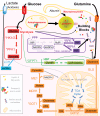The complex landscape of pancreatic cancer metabolism
- PMID: 24743516
- PMCID: PMC4076815
- DOI: 10.1093/carcin/bgu097
The complex landscape of pancreatic cancer metabolism
Abstract
Pancreatic ductal adenocarcinomas (PDA) are extremely aggressive cancers and currently available therapies are only minimally effective in treating this disease. Tackling this devastating cancer has been a major challenge to the scientific and medical communities, in part due to its intense therapeutic resistance. One of the aspects of this tumor that contributes to its aggressive behavior is its altered cellular metabolism. Indeed, PDA cells seem to possess the ability to adapt their metabolism to the particular environment to which they are exposed, including utilizing diverse fuel sources depending on their availability. Moreover, PDA tumors are efficient at recycling various metabolic substrates through activation of different salvage pathways such as autophagy and macropinocytosis. Together, these diverse metabolic adaptations allow PDA cells to survive and thrive in harsh environments that may lack nutrients and oxygen. Not surprisingly, given its central role in the pathogenesis of this tumor, oncogenic Kras plays a critical role in much of the metabolic reprogramming seen in PDA. In this review, we discuss the metabolic landscape of PDA tumors, including the molecular underpinnings of the key regulatory nodes, and describe how such pathways can be exploited for future diagnostic and therapeutic approaches.
© The Author 2014. Published by Oxford University Press. All rights reserved. For Permissions, please email: journals.permissions@oup.com.
Figures

Similar articles
-
The plasticity of pancreatic cancer metabolism in tumor progression and therapeutic resistance.Biochim Biophys Acta Rev Cancer. 2018 Aug;1870(1):67-75. doi: 10.1016/j.bbcan.2018.04.011. Epub 2018 Apr 24. Biochim Biophys Acta Rev Cancer. 2018. PMID: 29702208 Free PMC article. Review.
-
Targets (Metabolic Mediators) of Therapeutic Importance in Pancreatic Ductal Adenocarcinoma.Int J Mol Sci. 2020 Nov 12;21(22):8502. doi: 10.3390/ijms21228502. Int J Mol Sci. 2020. PMID: 33198082 Free PMC article. Review.
-
Transcriptional control of autophagy-lysosome function drives pancreatic cancer metabolism.Nature. 2015 Aug 20;524(7565):361-5. doi: 10.1038/nature14587. Epub 2015 Jul 13. Nature. 2015. PMID: 26168401 Free PMC article.
-
Catabolic pathways regulated by mTORC1 are pivotal for survival and growth of cancer cells expressing mutant Ras.Oncotarget. 2015 Dec 1;6(38):40405-17. doi: 10.18632/oncotarget.6334. Oncotarget. 2015. PMID: 26575954 Free PMC article.
-
Oncogenic KRAS activates hedgehog signaling pathway in pancreatic cancer cells.J Biol Chem. 2007 May 11;282(19):14048-55. doi: 10.1074/jbc.M611089200. Epub 2007 Mar 12. J Biol Chem. 2007. PMID: 17353198
Cited by
-
Serum Metabolomic and Lipoprotein Profiling of Pancreatic Ductal Adenocarcinoma Patients of African Ancestry.Metabolites. 2021 Sep 28;11(10):663. doi: 10.3390/metabo11100663. Metabolites. 2021. PMID: 34677378 Free PMC article.
-
The Intricate Metabolism of Pancreatic Cancers.Adv Exp Med Biol. 2018;1063:73-81. doi: 10.1007/978-3-319-77736-8_5. Adv Exp Med Biol. 2018. PMID: 29946776 Review.
-
Potential Role of ANGPTL4 in the Cross Talk between Metabolism and Cancer through PPAR Signaling Pathway.PPAR Res. 2017;2017:8187235. doi: 10.1155/2017/8187235. Epub 2017 Jan 15. PPAR Res. 2017. PMID: 28182091 Free PMC article. Review.
-
Extracellular Regucalcin: A Potent Suppressor in the Cancer Cell Microenvironment.Cancers (Basel). 2025 Jan 13;17(2):240. doi: 10.3390/cancers17020240. Cancers (Basel). 2025. PMID: 39858022 Free PMC article. Review.
-
NO• /RUNX3/kynurenine metabolic signaling enhances disease aggressiveness in pancreatic cancer.Int J Cancer. 2020 Jun 1;146(11):3160-3169. doi: 10.1002/ijc.32733. Epub 2019 Nov 19. Int J Cancer. 2020. PMID: 31609478 Free PMC article.
References
-
- Siegel R., et al. (2013). Cancer statistics, 2013. CA. Cancer J. Clin., 63, 11–30 - PubMed
-
- National Cancer Institute (2012). SEER Cancer Statistics Factsheets: Pancreas Cancer. National Cancer Institute, Bethesda, MD: http://seer.cancer.gov/statfacts/html/pancreas.html (6 May 2014, date last accessed).
-
- Hidalgo M. (2010). Pancreatic cancer. N. Engl. J. Med., 362, 1605–1617 - PubMed
-
- Li D., et al. (2004). Pancreatic cancer. Lancet, 363, 1049–1057 - PubMed
Publication types
MeSH terms
Substances
Grants and funding
LinkOut - more resources
Full Text Sources
Other Literature Sources
Medical
Molecular Biology Databases
Miscellaneous

